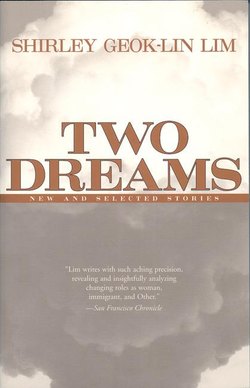Читать книгу Two Dreams - Shirley Geok-lin Lim - Страница 6
На сайте Литреса книга снята с продажи.
ОглавлениеPreface
I CONSIDER THIS collection of short stories a furoshiki, a kind of patterned handkerchief that a woman folds in pleats and bows to carry a small package—a gift of fruit, for example, or her lunch. It is a shawl, such as another woman at the end of another story threw over herself to cover her shoulders for warmth; a sort of scarf, to cloak a woman’s head for modesty, and also a fabric of many colors, spun deliberately for display.
The stories in the collection span the years from 1969 to 1996. The earliest stories were composed when I had just barely turned a woman, neither at ease in a modern world of choices and freedom—including the freedom to end at the bottom of an emotional and social scrapheap—nor able to live gracefully with the moral constraints that had structured Chinese Malaysian women’s lives for centuries, before they cracked in the contact with Western ideas, more dangerous than seducers or midnight lovers.
I have been writing in between America and Asia, and in between chores and duties, for over thirty years. I began writing as a poet. Poetry, the liberal taskperson, requires adventuring into critical essay and interpretation, narrative and imagination. The stories collected here happened when I gave myself permission to slip the traces of academe, and to trace instead the deceptive wavering line of “once upon a time.”
Once upon a time, there was a country called . . .
In many of these stories, that country lies in the past, in a place that is neither history nor memory, neither family nor nation, but nonetheless a place real to Malaysians—and I hope also to American readers who wish to know what was to be seen and heard and felt in another country in which English and British were as fantastic as Chinese and indigenous, and all made a brew of rich misery and meanings which only storytelling can retrieve.
Some of these stories retell themselves, with new details and with added voices, despite the old ghosts. Looking for women as desperately as I have all my life, I imagine sisters again and again—women who measure each other, betray each other, warm each other with talk and food. So a more contemporary story, “Sisters,” rewrites “Mr. Tang’s Girls,” written almost fifteen years earlier, as, sisterless, I reimagine women of my blood, from my blood, entering the world of the page.
But even imagined women, like imaginary gardens, are constructed within contested geographies. Two Dreams takes the forms of post-colonial places: tropical Malaysia and Singapore, into whose narrow estuarine ports Joseph Conrad had sailed in the nineteenth century with visions of Malay-European romances; the lonely American cities that conceal and shelter the Asian immigrant; the spaces in between airports.
I came to cold snowy Boston in 1969. Having lived in the United States for almost as long as I have been writing stories, I have stored-up tales of America yet to write. Two Dreams returns to the place where these stories began, imagining a past different from the one that I have lived—perhaps a past that looks forward to a place where the possessive can ring, not like loss but like love.
Shirley Geok-lin Lim
Santa Barbara, California
1996
